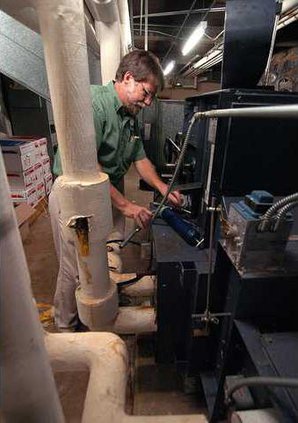When Gainesville’s Parks and Recreation Director Melvin Cooper presented his plan to run the city’s recreation facilities in the coming fiscal year with a bank account that was about 16 percent smaller than the current year, he said the plan met maintenance and operation needs for 2011.
But barely.
“If, for example, the heating and air conditioning system — the chiller — went out here at the civic center, that’s a major item there,” Cooper told the council. “There’s not any money in our maintenance and operating budget to replace that chiller with if it were to, hypothetically, go out, which we’re hoping it doesn’t. If that happens, in order for us to repair that, City Council, we may need to come to you and ask for help.”
Department officials say they have two major saving graces to keep them out of the City Council’s pockets next fiscal year.
Parks and Recreation officials are required to keep a reserve equal to one month’s operating expenses — currently about $351,000 — to pay for such catastrophes.
But also, the department’s top two officials say aggressive efforts at preventive maintenance might head off any unexpected troubles and keep repair costs down.
“Normally, we’re able to catch things before they get to a point where it’s disastrous for us,” said Michael Graham, the department’s deputy director.
And while Parks and Recreation hasn’t suffered the same loss of sales tax dollars as other city departments that operate on Gainesville’s general fund, parks officials have had to make sacrifices.
The department runs on two revenue streams, property taxes and fees for service.
The department has its own portion of the city’s millage rate. Three quarters of a mill on each city tax bill pays for the department’s operation.
But the property tax revenues that are to carry the department through the fiscal year that begins July 1 are projected to be more than $54,000 less than the current fiscal year, Cooper said.
The millage rate for parks and recreation has not changed since 1994, and a tax increase is off the table, Cooper said.
Proposed at $4.1 million, the department’s spending plan for fiscal year 2011 is about $800,000 smaller than its current budget.
But Cooper said users of the city’s parks and recreation sites won’t notice that difference this year.
“We’re doing our dead-level best to keep services the same as we’ve kept them in the past,” he said.
Partnerships with other like-minded organizations are saving some of the city recreation services. Because of budget constrictions, Cooper said the city is only able to operate one summer camp site this summer.
But while city officials say they can only afford to keep the site at New Holland Core Knowledge Academy open, the Boys & Girls Clubs of Hall County has expanded its summer camp program into the old Fair Street elementary school site, Cooper said.
“Can we tighten our belts any more before we have to eliminate some services? We’re almost there,” Graham said.
The biggest changes this year will not be in the services provided, but in the shifting of priorities for several park improvements the department had planned.
With two years of continual budget reductions, the department has stopped shelling out as much money for aesthetics and focused on the core of its operations.
“We’re not going to sit back just because the economy is where it is and say ‘woe is me, we can’t provide these services,’” Cooper said. “We’re going to do everything in our power to continue providing these services: keeping our grass cut, keeping our parks safe and accessible. Yeah, we’re hurting, but we understand our citizens are hurting as well.”
The department stopped planting seasonal flowers around signs and at parks, cut costs on pine straw and have decided only to repair facilities that have safety issues.
“Flowers alone could cost about $1,500 to $2,000 and then, of course, you’ve got the manpower to put those in,” Graham said.
“...In terms of maintenance of some of the areas, and particularly with repairs and maintenance, we’ve only put monies in our budget to do necessary repairs.”
This year, the department redirected its goal for a future youth baseball complex and instead made Lanier Point softball complex a multi-use facility where youth baseball could be played, Graham said.
“A youth athletic complex was on our docket as a major capital project, but we know that could be years and years down the line,” Graham said. “We were trying to meet the need with what we had existing.”
Other postponed major capital projects include renovations of Wessell Park and Holly Park.
About four years ago, the department held public meetings on the state of Wessell Park, and ever since, plans for its complete renovation have been on the books.
Improvements for Holly Park are estimated at $3 million in two $1.5 million phases, and improvements for Wessell Park likely would cost $1.5 million, Graham said.
And though the current special purpose local option sales tax does include $3 million for park improvements like those planned for Wessell and Holly parks, collections aren’t what city officials had hoped for.
“There’s just not funds there for us to do those right now,” Cooper said.




